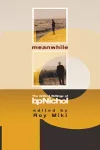
Meanwhile
bp Nichol - Paperback
£21.99
Barrie Phillip Nichol (1944; 1988) was born in Vancouver, British Columbia, and grew up there and in Winnipeg, Manitoba and Port Arthur, Ontario, returning to Vancouver in 1960. He received his elementary certificate from UBC in 1963. During his short tenure at university he audited creative writing courses attended by some of the younger TISH group members. After a difficult year in Port Coquitlam, BC, where he taught a Grade 4 class, he moved to Toronto and worked at the University Of Toronto Library as a book searcher before joining the newly formed lay therapy foundation Therafields in 1967 as a therapist and administrator, a position he maintained until 1983. Nichol began writing fiction around 1961, but he first attracted public notice in the mid-1960s with his hand-drawn and concrete poems. He valued particularly the personal aesthetic ground that concrete poetry gave him amid that period's various controversies about poetic theory. Concrete poetry also gave him almost immediately an international audience and reputation. Among the twenty-nine books and pamphlets Nichol published between 1965 and 1968, three each were published in England and the US. Nearly all these booklets contain only concrete work. The full range of Nichol's writing became apparent only with the publication of the relatively conventional free verse of Journeying & the returns (1967), and Monotones (1971) - which developed into Nichol's best-known work, The Martyrology, Books 1 and 2 (1972); Books 3 and 4 (1976); Book 5 (1982); Book 6 Books (1987); and the posthumously published Gifts: Book[s] 7&8; (1990) and Ad Sanctos (1993) - as well as the prose work Two Novels (1969). He has also published the prose collection Craft dinner (1978), the novel Journal (1978), the visual books Still Water (1970) and ABC: the Aleph Beth book (1971), and innumerable booklets and pamphlets. Still Water, together with the booklets The true eventual story of Billy the Kid (1970) and Beach Head (1970) and the anthology of concrete poetry, The Cosmic Chef (1970), won the Governor General's Award for poetry. All of Nichol's work is stamped by his desire to create texts that are engaging in themselves as well as in context, and to use indirect structural and textual devices to carry meaning. In The Martyrology different ways of speaking testify to a journey through different ways of being. Language is both the poet's instructor and, through its various permutations, the dominant 'image'; of the poem. The [nine] books of The Martyrology document a poet's quest for insight into himself and his writing through scrupulous attention to the messages hidden in the morphology of his own speech. This attention to syntax and morphology characterizes both Nichol's concrete poetry and his prose fiction. His concrete poems have been typically written as sequences, and involve the sequential development of syllabic relationships (Still Water) or of alphabetic shapes (Unit of Four, 1974; and Aleph Unit, 1974). His prose fiction employs Gertrude Stein's technique of using evolving yet repetitive syntax, to develop language both as a correlative for intense emotional states, as in Journal, and as a medium to divine meaning, as in The true eventual story of Billy the Kid. Nichol first began performing as a sound poet in the mid-1960s. His early work in this medium was documented, together with early reflective poems, in Michael Ondaatje's film Sons of Captain Poetry (1970); in 'Borders', a small phonodisc included in bp (1967); and in the long playing record Motherlove (1968). In 1970 he began what proved to be an extended collaboration with fellow poets Rafael Barreto-Rivera, Paul Dutton, and Steve McCaffery, forming the sound-poetry group The Four Horsemen. - adapted from Frank Davey's entry in the 1983 edition of The Oxford Companion to Canadian Literature, edited by William Toye; with thanks to Frank Davey In the mid 1980s bp Nichol became a successful writer for the children's television show Fraggle Rock, produced by Jim Henson of Muppets fame, along with fellow Toronto writers Dennis Lee and David Young. The astounding range of Nichol's practice included musical theatre (Group and Tracks), children's books, comic book art and collage/assemblage. A second film has been made on Nichol, his art and his legacy: bp: pushing the boundaries (B. Nash, director & Elizabeth Yake, producer, 1998). Nichol's magnum opus has created a minor academic sub-industry by itself. Nichol's less prosaic, more edgy, works include The Captain Poetry Poems (1970), Konfessions of an Elizabethan fan dancer (1967, 1973), Love: A book of remembrances (1974), Zygal: A Book of Mysteries and Translations (1985), Art Facts (1990) and Truth: A book of fictions (1991).